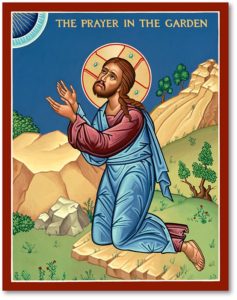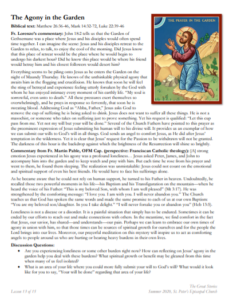
Biblical text: Matthew 26:36-46, Mark 14:32-72, Luke 22:39-46
Fr. Lorenzo’s commentary: John 18:2 tells us that the Garden of Gethsemane was a place where Jesus and his disciples would often spend time together. I can imagine the scene: Jesus and his disciples retreat to the Garden to relax, to talk, to enjoy the cool of the morning. Did Jesus know that this place of retreat would be the place where he would begin to undergo his darkest hour? Did he know this place would be where his friend would betray him and his closest followers would desert him?
Everything seems to be piling onto Jesus as he enters the Garden on the night of Maundy Thursday. He knows of the unthinkable physical agony that awaits him in the flogging and crucifixion. He knows that soon he will feel the sting of betrayal and experience feeling utterly forsaken by the God with whom he has enjoyed intimacy every moment of his earthly life. “My soul is sorrowful, even unto to death.” All these pressures exert themselves so overwhelmingly, and he prays in response so fervently, that soon he is sweating blood. Addressing God as “Abba, Father,” Jesus asks God to remove the cup of suffering he is being asked to drink. Jesus does not want to suffer all these things. He is not a masochist, or someone who takes on suffering just to prove something. Yet his request is qualified: “Let this cup pass from me. Yet not my will but your will be done.” Several of the Church Fathers have pointed to this prayer as the preeminent expression of Jesus submitting his human will to his divine will. It provides us an exemplar of how we can submit our wills to God’s will in all things. God sends an angel to comfort Jesus, as He did after Jesus’ temptation in the wilderness. Yet it is clear that Jesus’ request for the Passion to be withdrawn will not be granted. The darkness of this hour is the backdrop against which the brightness of the Resurrection will shine so brightly.
Commentary from Fr. Martin Pable, OFM Cap. (perspective: Franciscan Catholic theology): [A] strong emotion Jesus experienced in his agony was a profound loneliness… Jesus asked Peter, James, and John to accompany him into the garden and to keep watch and pray with him. But each time he rose from his prayer and went to them, he found them sleeping. The realization was unmistakable: Jesus could not count on the emotional and spiritual support of even his best friends. He would have to face his sufferings alone.
As he became aware that he could not rely on human support, he turned to his Father in heaven. Undoubtedly, he recalled those two powerful moments in his life—his Baptism and his Transfiguration on the mountain—when he heard the voice of his Father: “This is my beloved Son, with whom I am well pleased” (Mt 3:17). He was strengthened by the comforting message: “I love you. I am with you. I will never abandon you.” The Church teaches us that God has spoken the same words and made the same promise to each of us at our own Baptism: “You are my beloved son/daughter. In you I take delight.” “I will never forsake you or abandon you” (Heb 13:5).
Loneliness is not a disease or a disorder. It is a painful situation that simply has to be endured. Sometimes it can be ended by our efforts to reach out and make connections with others. In the meantime, we find comfort in the fact that Jesus, our savior, has shared—and understands—our pain. Perhaps we can learn to embrace our own times of agony in union with him, so that those times can be sources of spiritual growth for ourselves and for the people the Lord brings into our lives. Moreover, our prayerful meditation on this mystery will inspire us to act as comforting angels to people around us who are hurting or bearing heavy burdens in their own lives.
Discussion Questions:
- Are you experiencing loneliness or some other burden right now? How can reflecting on Jesus’ agony in the garden help you deal with these burdens? What spiritual growth or benefit may be gleaned from this time when many of us feel isolated?
- What is an area of your life where you could more fully submit your will to God’s will? What would it look like for you to say, “Your will be done” regarding that area of your life?



Comments are closed.